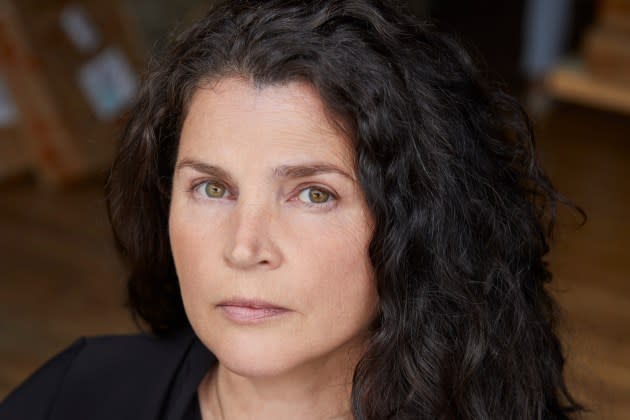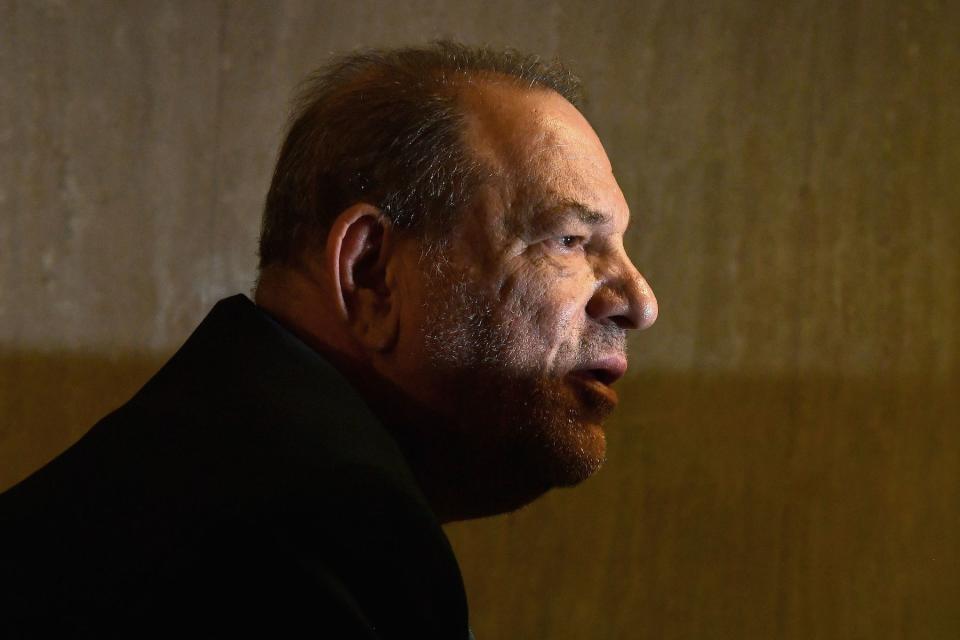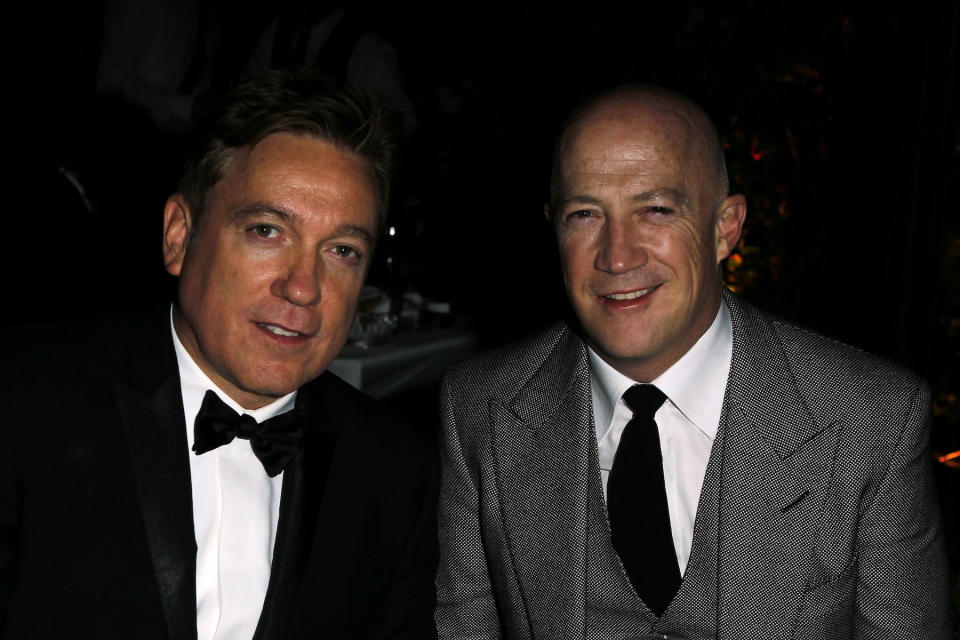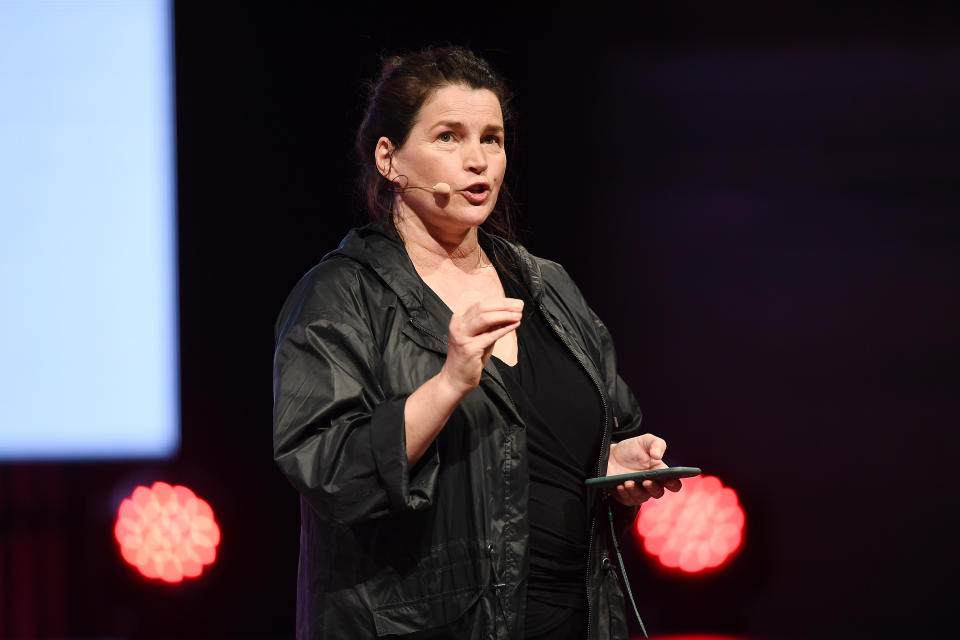Julia Ormond Explains Why She’s Taking on Weinstein, CAA, and Disney
- Oops!Something went wrong.Please try again later.
- Oops!Something went wrong.Please try again later.

Julia Ormond has been “living in fear.” The British actress known for her roles in films like Legends of the Fall, First Knight and Sabrina, as well as an Emmy-nominated turn on television’s Mad Men, alleges that in December of 1995, at the height of her stardom, she was sexually assaulted by film producer Harvey Weinstein. Though she says she’d confided in family, friends, and her powerful CAA agents at the time — Bryan Lourd and Kevin Huvane — about what transpired, she’s been reluctant to come forward publicly about that horrifying night, and the deaf ears she says it fell on at CAA, until now.
“I’ve been caught in this trap of, ‘I’m going to face horrendous backlash of maybe never working again if I speak out, and I love what I do and don’t want to lose that, but I don’t want to participate in it as a hypocrite either,’” the actress tells Rolling Stone. “I am seeking accountability for myself and hoping that will bring further change.” (Weinstein “categorically denies” Ormond’s allegations.)
More from Rolling Stone
Coldplay Countersue Ex-Manager, Claiming He Let Tour Costs Rise Out of Control
'Fair Play' Director Chloe Domont on Consent and That Shocking Ending
Hipgnosis Songs Group CEO Kenny MacPherson Placed on Leave Following Sexual Assault Claim
On Oct. 4, Ormond filed a lawsuit in New York State Supreme Court accusing Harvey Weinstein of sexual battery. She is also suing her agency at the time, CAA; Weinstein’s company at the time, Miramax; and its then parent company, The Walt Disney Company. The lawsuit is being brought by Effie Blassberger and Isabelle A. Kirshner of Clayman, Rosenberg, Kirshner & Linder LLP; Douglas H. Wigdor and Meredith A. Firetog of Wigdor LLP; and Kevin Mintzer and Laura L. Koistinen, and was first reported by Variety. Weinstein has been accused of sexual assault by over 100 women and is currently serving a 21-year sentence for rape in New York followed by a 16-year sentence in California.
According to the suit, Ormond met Weinstein in early 1994 as her star was on the rise, and the two maintained a professional relationship discussing screenplays, with Weinstein sending Ormond scripts and Ormond replying with her notes. By 1995, the suit states that Ormond signed with Bryan Lourd and Kevin Huvane of CAA as her U.S. agents. (Lourd is now CEO of CAA and the two are each co-chairman.) After leading roles in First Knight and Sabrina, stepping into stilettos once occupied by Audrey Hepburn in the latter, the suit claims that Lourd and Huvane secured a two-year first-look deal with Weinstein’s Miramax for Ormond and her production company. As part of the deal, Ormond moved from England to New York City, started working out of Miramax’s downtown offices, and lived in an apartment paid for by Miramax.

Ormond alleges in the suit that in December 1995, CAA helped arrange a business dinner between Ormond and Weinstein to talk about the status of a project they were working on.
“At the dinner, Weinstein refused to discuss business matters and kept changing the subject. Finally, following dinner, Weinstein said he would only discuss the project back at the apartment Miramax had provided for Ormond as part of their first-look deal with her,” the lawsuit reads. “Her defenses down because she had consumed several drinks, and wanting to finally get to what she thought was the purpose of their meeting, Ormond agreed to have Weinstein come back to her apartment. Soon after, Weinstein stripped naked and forced her to perform oral sex on him.”
“That sexual assault on Ormond could have been prevented if Miramax or Disney had properly supervised Weinstein and not retained him while knowing that he was a danger to the women he encountered at work. Likewise, had CAA fulfilled its legal duties to Ormond to look out for her well-being, to not place her in danger, and to warn her about Weinstein’s predations, Ormond would not have been in a position to be victimized by Harvey Weinstein,” the suit states. (CAA has called the suit “completely without merit,” while Miramax and Disney have yet to respond to it.)
On top of acting, Ormond has served as a United Nations Goodwill Ambassador and has fought to put an end to human trafficking since the ‘90s, founding the Alliance to Stop Slavery and End Trafficking (ASSET) in 2007.
In her first sit-down interview about the lawsuit, Ormond, who is now 58, opened up to Rolling Stone about why she’s taking on Weinstein, talent agency CAA, and Disney.
What compelled you to come forward now?
The Adult Survivors Act. It is a new New York law which allows a lookback window for people whose statute of limitations has lapsed to bring their case forward. That was really the enabler for me. But to clarify, I had come forward to loved ones, family, and British law enforcement — and in the U.K., I guess the law is different. In the U.K. they were considering me as a witness, and I think their case [against Harvey Weinstein] is still ongoing. They ask people not to blog and not to go public about stuff because it can potentially put out details that would be helpful for their case. But the Adult Survivors Act allowed me to revisit it in a way that was impactful and got me out of a kind of position of forced silence. Whereas the #MeToo movement allowed me to see that speaking out, if I was ready to speak out, is the next step to more positive social change.
When did you make your report with British law enforcement?
My understanding is that the #MeToo story [about Weinstein] broke in [October] 2017, and at the time I was off in Australia shooting a film and wanted time with my family face to face, so the first opportunity I had to be with them to do that was in early 2018, and that’s when I reported it.
Could you walk me through the steps of how Harvey Weinstein allegedly preyed on you?
There was something about the familiarity in our industry that he leveraged to have grooming less easy to identify. At the time, it was very typical that if a producer came into the U.K. from out of town, you would meet them in the living room of their hotel suite. The first time I met him was at the Savoy Hotel. We had a very long meeting. It ran over by an hour because we started discussing film, and I discovered that many of the movies I loved were his movies. For me, the foundation of our relationship was his appreciation of me in terms of my smarts and passion around movies, which was something that was devastating and has taken me a long time to realize, well, maybe it was both. This guy was just stringing you along and that was part of the grooming. He then went over and above on a gesture of generosity that was personal, and the next meeting there was more dysfunction.

And then Weinstein visited the set of your film Smilla’s Sense of Snow.
The assault happened, and soon after I got word that he was going to Copenhagen early on in the shoot of Smilla’s Sense of Snow. This was unusual. Harvey had never visited me on a set before. That was when I reached out to Bryan [Lourd] and Kevin [Huvane] in a panic and said, “Can you stop this?” and they said, “You have to deal with him on your own.” I wasn’t reaching out to them about the assault yet. I held Harvey to account on my own and then went about the business of the day. Almost immediately afterwards, it felt clear that he was retaliating, and that’s when I called [Lourd and Huvane] and described what happened and said that I thought it was retaliation.
Can you tell me whatever you can about the retaliation?
My first-look deal at Miramax was a two-year deal. I went straight back after shooting Smilla to meet with [Weinstein] and he basically said, “Meryl Poster hates you, so you’re fucked at the company.” Meryl Poster [co-president of production at Miramax] was regarded as his right-hand person. He also didn’t pursue the development of a film I had in development that we’d just done quite an expensive scout on [West With the Night], so it was odd that he’d stop it when he’d put quite a bit of development money in, and he ceased development on other projects we had. I sensed a shift, and my production company sensed a shift. Bryan [Lourd] and Kevin [Huvane] were distancing themselves [from me] and wanted to shift me to a younger agent, and Meryl Poster asked for every single script that CAA was sending me. But I was like, wait, not every script I’m getting as an actress is part of our first-look production deal. You have no right to see everything. That, to me, was weird that they asked for that. I felt I had to open up about what had happened. And then [the retaliation] got so obvious that I felt like I needed to bring on a manager, and then I left CAA. And why would you leave Bryan Lourd or Kevin Huvane? I’m not totally sure what happened on their side, but I know what I experienced.
Poster did not respond to a request for comment.
What was it like when you reported the allegation against Weinstein to CAA at the time?
The one point that I would make is that they weren’t surprised, they didn’t disbelieve me, and they guided me to silence. Otherwise, I think it’s pretty clear the way it’s laid out in the complaint as to how they responded.
According to Ormond’s lawsuit, “Not only did CAA fail to meet those basic obligations, but it compounded the damage once Ormond told her CAA agents, Bryan Lourd and Kevin Huvane, what Weinstein had done to her. Rather than take Ormond’s side and advocate for her interest, they suggested that if she reported Weinstein to the authorities, she would not be believed, and he would seriously damage her career. Still worse, not long after Weinstein’s assault on Ormond and her reporting of the assault to them, CAA lost interest in representing her, and her career suffered dramatically.”
One thing we’ve seen is an almost complete lack of accountability from CAA. I know they released a brief statement around October 2017 when The New York Times ran an extensive investigation into “Weinstein’s Complicity Machine” that examined CAA’s role in his predation, saying they “[apologized] to any person the agency let down for not meeting the high expectations we place on ourselves,” and they partnered with Time’s Up before it imploded, but that Times investigation revealed that “eight talent agents [at CAA] were told that Mr. Weinstein had harassed or menaced female clients, but agents there continued to arrange private meetings.”
The drive for me is to get myself out of a situation where I feel I’m contributing to an ongoing ineffective response to what’s happened that could kick up a notch. I’ve spent a large part of the last twenty years working on transparency in supply chains — trafficking, forced labor, child labor in supply chains — in other words, working toward making the workforce safe. What I’ve found is that our legal structures actually trap those that need releasing. It’s not just about the victims of it, but our legal system traps the very people who need to be held accountable. They’re not going to hold themselves accountable because that puts them at further risk. Could they have done something different? Absolutely. But I get why they didn’t. They need to be held accountable by the people outside of it, and it’s up to us to hold them accountable and take that step.

I agree. They’re very unlikely to do it themselves at this point.
For me, the first step of seeking further closure — I don’t think I’ll ever be able to go back to the person I was before — was about sitting down with them and having a conversation, and their first response was, “No, I’m not going to do that.” And then we entered into a back and forth. It’s quite hard in an era of settlements that are bonded with a non-disclosure agreement, which is an area that needs disrupting. I am open to the idea that [CAA] was kind of trapped by their own legal stuff on some level as well that would justify what feels like a cover-up, but also their response to me at the time, when I look back on it, was chilling. At the time, it was really disorienting how they responded. When #MeToo broke, so many people reached out to me because they knew I had a deal at Miramax and what happened to me career-wise.
CAA issued the following statement on Ormond’s suit: “CAA takes all allegations of sexual assault and abuse seriously, and has compassion for Ms. Ormond and the experience she described in her complaint. However, the claims that Ms. Ormond levied against the agency are completely without merit. Through counsel, Ms. Ormond approached CAA in March with these allegations about the agency. Knowing these allegations to be untrue, the agency then retained Loretta Lynch and her law firm, Paul Weiss, to defend the company. Their review found nothing to support Ms. Ormond’s claims against CAA. CAA received a demand, through its counsel, from Ms. Ormond’s attorneys, that CAA pay $15,000,000 in exchange for Ms. Ormond not making the allegations against CAA public. CAA immediately rejected this demand.” A lawyer for Ormond calls this “revolting.”
I wanted to discuss CAA’s statement about your allegations and their decision to call them “completely without merit.”
Their response now is not particularly a surprise because I know what their previous responses have been. They’re continuing on with behaviors that have protected them so far. I will say that I’ve been very clear with my law firm that my condition around finding a settlement is that I will not sign an NDA.
CAA also accuse you of asking for $15 million. They’re essentially framing it like you’re out for money.
There’s a pushback that’s about discrediting people, and part of it is, “Oh, this person just wants money.” I think I’ve lived a life that has made it very clear that what I want is accountability and transparency.
There’s a pushback that’s about discrediting people, and part of it is, “Oh, this person just wants money.” I think I’ve lived a life that has made it very clear that what I want is accountability and transparency.
Your story echoes what actress Mia Kirshner told The New York Times in that October 2017 story, which is that after CAA set up a meeting with her and Weinstein at a hotel, and he tried to exchange a role for sex, she reported it to her agent who she said advised her in so many words to drop it.
Yes. The other piece that I think is really critical is that it’s super hard for us to have a full timeline. We have some information, but I think we’re hoping that other people will take the opportunity, maybe even with the Adult Survivors Act, to use it to reconstruct a timeline. In an era where we want transparency, a mapping out of who knew what when would be really helpful. My stepping forward allows somebody who came after me and was told “We knew nothing” to rethink that.
I remember reading how when Gwyneth Paltrow came forward to The New York Times in 2017 about Weinstein, she said she didn’t suspect anything was amiss because “it’s on the fax, it’s from CAA,” meaning they scheduled the hotel meeting with Weinstein. And Rose McGowan called CAA “pimps” for Harvey Weinstein “that sent so many into the Monster’s Lair themselves.”
It’s not entirely clear to me the degree to which there was a conflict of interest internally for their fiduciary responsibilities, but your experience as a client, and as a plaintiff, is: you did not look after me, and you put profit for your company over your fiduciary responsibility to me — not just in this moment, and not just this one job, but for my future. And that has been massive. Their behavior sits somewhere between willful negligence of their fiduciary responsibility and active participation and procurement.
Agencies like CAA would put something to the effect of “Meeting with Harvey Weinstein at the Peninsula” on an itinerary, and their clients couldn’t really say no to that.
The way that you were given opportunities and encouraged as a client to build rapport with directors and producers was to go meet them for dinner. That was proposed as something that was special: go meet them for drinks, go meet them for dinner, and we’re going to separate you so you don’t have to go sign in on an audition. It meant they were thinking of you more specifically. So, [CAA] actively encouraged that. At the time, it felt like they were working for your interests, but if they knew more, that’s questionable behavior. Of the women who have come forward [against Weinstein], people should do a study to see who was represented by who at the time, because there does seem to be a disproportionate number of us who were with CAA. They would tell you to take your wedding ring off before going for an interview. And a lot of us said, “No.”
Of the women who have come forward [against Weinstein]… there does seem to be a disproportionate number of us who were with CAA.
You did one more film for Weinstein years after the alleged assault and retaliation, 2011’s My Week with Marilyn. How did that happen?
That came to be because the actress that was cast fell out, and I remember they were scrambling to cast really close to shooting. You would have to go to the producers to ask what was going on behind the scenes. There was a definite pushback from The Weinstein Company but in the end, I was cast. The premiere of My Week with Marilyn was at the AFI Fest at the Chinese Theatre [in Los Angeles] and there was an afterparty after and Harvey was there. My manager at the time knew there was some tension between me and Harvey but convinced me to go talk with him since he was a producer of the film. We went to go talk with him and it fell apart very quickly. He was very vicious with me and other people witnessed it. Why I go into this story is because there was a photographer who was taking photographs of the entire thing. I was almost in tears, and the photographer asked, “Can we get a happy picture?” and I rallied for the happy picture and took it. When the Harvey Weinstein #MeToo story broke, I tried to see if the photographs were still around and if the photographer would come forward, and they’d been removed. I am in the film, I was at the party, I took photographs with Harvey, and they’re not there.
How crazy of a scenario was that for you? Your alleged abuser is a producer on this film, you’re at this party of his, and your manager guides you to talk with your alleged abuser, and then he’s “vicious” toward you.
I think, for a lot of us, you just had to suck it up if you wanted to continue to work. But the social side of, “Do I go to events?” was always a complete mess for fear of running into him.

Let’s talk about Disney’s alleged role in this as well. Disney purchased Miramax in 1993 and Harvey and Bob Weinstein ran it until they left in 2005 to start The Weinstein Company. A number of women, yourself included, have claimed that they were sexually assaulted by Weinstein during that 12-year period. And your suit alleges that Disney had to have known about Weinstein’s predatory behavior.
In the complaint, it’s pretty clear and lays out the relationship that Miramax had with Disney. Those were details that I only got access to because if you bring a legal case, lawyers have access to information that you might not as a member of the general public. Having a legal team, which is something I was very uncertain of because it could be retraumatizing, has been very clarifying for me in a spectacular way. It’s given me the opportunity to get to what that relationship [between Miramax and Disney] was. From my newfound perspective, it feels like [Disney] just washed their hands of it. Instead of confronting it or holding him accountable, they continued to profit from it. That’s the sort of stuff that I think comes out in discovery. There are a lot of people who think that the enablers got off scot-free, and Disney is a part of that. They may feel like they’re one step removed, but they’re nevertheless part of a chain of events. My hope is that, as an industry, we can come together to fashion a better response and [Disney] does not double down in a defensiveness that will block their participation. This is an opportunity for them.
What do you hope to accomplish with this lawsuit? Bringing about systemic change?
Yes. The way that I see it is that accountability will lead to greater information. I hope that the industry will step up to fund ongoing research, potentially even a government task force that looks at all of these things — not just sexual assault and sexual harassment but bias, race, and other ways with which people are put into either unsafe or unequal work circumstances. We need to step up to the level of climate surveys in our industry to have real clarity. We live in a world where we have the technology so companies can gather the data of how many settlements a company has reached with employees and what the depth of harm is. We have the ability to grade all of those things and come up with a score. Then, as an employee, before this happens to you, you could see, “If I go work for Company A, they got an A+.” Or “They got an F.”
An agency like CAA also has the ability to get the brave actresses who’ve come forward to accuse powerful men like Harvey Weinstein of abuse and derailing their careers acting jobs, and yet we haven’t really seen much of that from the big agencies.
It is really tricky. If people have a sense of who the enablers were and they haven’t been held accountable, or even if they are held accountable, there’s a kind of blacklisting that happens as a backlash. And I know for sure that people would rather be working than have this be their final act. This has affected whistleblowers in other industries as well. You might get a pat on the back as a whistleblower but what you really want is your career back.
Best of Rolling Stone

